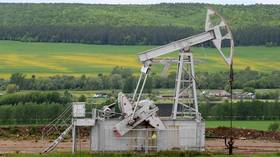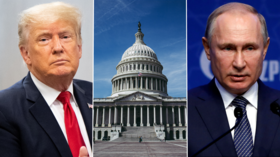West going green may lead to ‘catastrophic’ decline in demand for Russian oil, Moscow warns, as energy crisis hits China & EU

A worldwide focus on cutting carbon emissions and replacing fossil fuels could leave a gaping black hole in Russia’s economy if climate change measures put forward by some of the country’s biggest oil and gas customers catch on.
That’s according to Moscow’s Ministry of Finance, which warned on Friday that a catastrophic cratering in the fossil fuel market could be on the cards. Officials fear that crude oil could fall to $35 a barrel in 2030, and to just $25 by 2050. Crude oil is currently selling for more than $78 a barrel.
“The long-term outlook for oil demand is becoming increasingly negative,” it said in a new financial report. “If the stated intention of a number of countries to achieve carbon neutrality by 2050 is passed into law, and other countries follow this example, then demand for oil will drop dramatically.”
Also on rt.com Russia could offer extra gas to Western Europe as consumers see energy bills skyrocket amid squeeze on supplies, Kremlin revealsAt least 124 nations around the world have said that they are working to emit no more CO2 than they soak up by 2050, including the vast majority of Russia’s European export partners. The EU has described the “transition to a climate-neutral society” as both “an urgent challenge and an opportunity to build a better future for all.”
China, by far Moscow’s biggest trading partner, has set similar goals, but estimates it will only hit ‘net zero’ by 2060. Two nations, Bhutan and Suriname, have already hit the objective and now are responsible for taking in more of the global warming gas than they put out.
However, fuel markets are facing more short-term uncertainty at present, with the price of natural gas in much of the EU shooting up by around 250% in a matter of months. A number of analysts and observers have called on Russia to step up supplies of gas across the continent but the Kremlin has warned that state energy company Gazprom is currently meeting all of its existing orders, and that while it is interested in securing new contracts, deliveries may not be immediate.
At the same time, Beijing has reportedly reached out to request emergency imports of Russian electricity after supplies of coal, which powers more than half of the country’s national grid, began running low. A number of regions have experienced outages as a result, with shops, factories and cell phone networks said to be affected.
Earlier this week, the EU and the UK called on Moscow to commit to setting an emissions reduction target of its own. “We invite Russia to make even more ambitious commitments to achieve zero net carbon emissions by 2050, joining us and many other countries that have already stated similar goals,” a joint statement from the Western nations’ ambassadors read.
Also on rt.com Putin says effects of global climate change disproportionately hitting Russia, as country battered by floods & raging wildfiresRussian President Vladimir Putin declared over the summer that a series of wildfires and floods that battered the world’s largest country were “if not entirely then at least to a large extent down to global climate change.”
Like this story? Share it with a friend!














